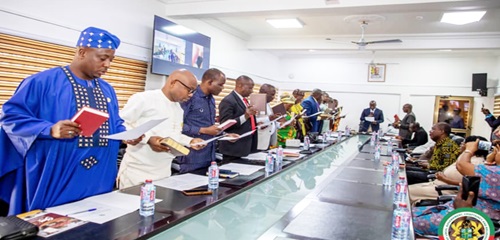The sixth governing council of the Local Government Service (LGS) has been constituted, with a charge on members to explore innovative policies that will make local governance the engine of the country’s development.
The 15-member council, which is chaired by a former Ambassador of Ghana to Germany, Akua Sena Dansua, has also been tasked to make the reset agenda of the government reflect in enhanced grassroots participation in the country’s democratic process.
The Minister of Local Government, Chieftaincy and Religious Affairs, Ahmed Ibrahim, swore the council into office today (July 15), underscoring the need to take the LGS to a higher pedestal.
Council members
Some of the members of the council are Buipewura Mahama Abdulai Jinapor II, National House of Chiefs; Amin Abdul-Rahaman, Ministry of Local Government, Chieftaincy and Religious Affairs; Prof. Nicholas Awortwi, Director, ILGS; Dr Audrey Smock Amoah, National Development Planning Commission; Inusah Shirazu, Ministry of Education, and Dr Koku Awoonor-Williams, Technical Advisor at the Ministry of Health.
The rest are Prof. Lord Mensah, Local Government Service; Michael Harry Yamson, District Assemblies’ Common Fund; Alfred Asiedu Adjei, National Association of Local Authorities of Ghana; Mahamood Shakil Kpedau, Local Government Workers’ Union, and Christopher Kwaku Dapaah, a member.
Context
The LGS Council was set up in accordance with section 49 of the Local Government Act, 2016 (Act 936), which established the LGS.
Section 50 of Act 936 puts out the membership of the LGS Council to include persons drawn from offices and departments of Metropolitan, Municipal and District Assemblies (MMDAS) and Regional Coordinating Councils (RCCs), Office of the Head of Local Government Studies (OHLGS) and other persons that may be deemed needed for the effective running of the council.
As spelt out in Section 51 of Act 936, the objective of the LGS is to ensure effective administration and management of the decentralised local government system in the country.
Diligence
Mr Ibrahim said achieving the mandate as provided for in Act 936 would require the members of the Council to work together with stakeholders within the local governance space.
He said it was imperative for the Council to bring their expertise from various fields to bear to promote efficiency, professionalism and accountability in the local governance process.
“The Local Government Service represents the frontline of governance, the conduit through which the aspirations of our people are translated into tangible outcomes. Its impact reverberates across every community, influencing livelihoods, promoting inclusion and driving development,” he said.
Assurance
For her part, Ambassador Dansua said the council was aware of the onerous responsibility on its shoulders and would stop at nothing to ensure effective local government.
She said, daunting as the mandate looked, the council would go all out to make a lasting impact on the delivery of local government services in the country.
“Ghanaians are looking up to us to rekindle the spirit of participation at the local level, and I assure the President that we will deliver on the job and excel,” she said.

